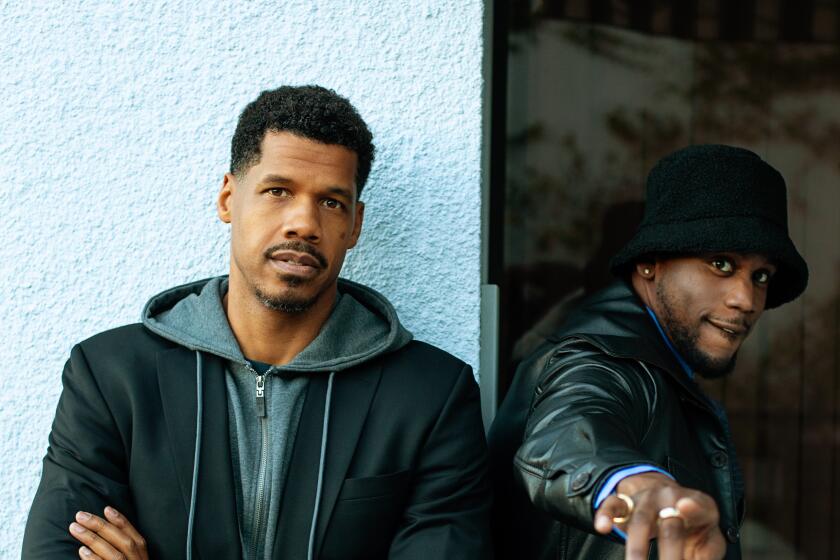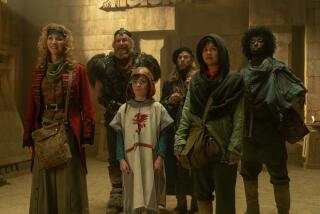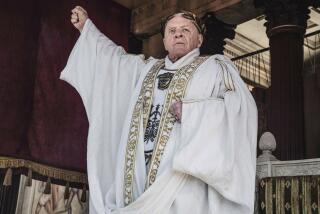Pirates are no stranger to pop culture. Taika Waititi’s new show adds ‘polite menace’
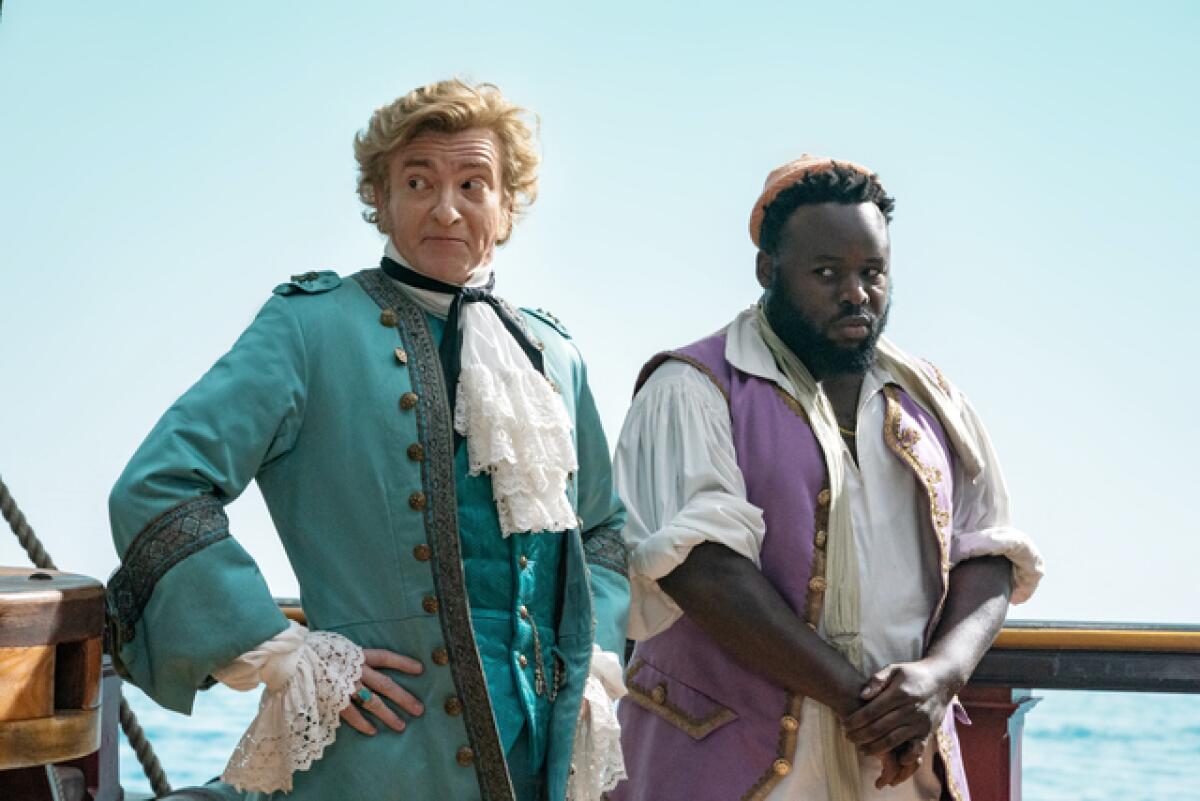
- Share via
In the fine, funny, oddly sweet and surprisingly fact-based period comedy “Our Flag Means Death,” beginning Thursday on HBO Max, Rhys Darby plays Stede Bonnet, a wealthy landowner who, in 1717, bored with his life, leaves his wife and children to become a pirate captain. It’s a job for which he has no qualifications, and his image of which has been formed entirely from books. In his first raid, he manages to steal an apparently dead plant from some fishermen, wishing them good luck with their fishing as they depart. He has no taste for bloodshed, or other traditional requirements of piracy; it’s as if this is the only way he can imagine going to sea.
Like the historical Bonnet, if likely for more aspirational, delicate reasons, Stede will fashion himself a Gentleman Pirate: “Why can’t one be a gentleman and a pirate? … Polite menace, that’ll be my brand.”
The series was created by American writer David Jenkins and produced by the prolific Taika Waititi, who also stars as Blackbeard, to whom he brings a leonine grace. (He’s just built that way.) Like Jenkins’ wonderful, terminated-too-soon “People of Earth,” which located a streak of banality among alien invaders, and Waititi’s “What We Do in the Shadows,” which brought vampires down to Earth, “Our Flag Means Death” takes an exotic subject and humanizes it, makes it more familiar through modern speech and attitudes. (“Lame,” “I’m out,” a fist bump.)
Inside the grueling training regimen Quincy Isaiah and Solomon Hughes endured to play Magic Johnson and Kareem Abdul-Jabbar in “Winning Time.”
It’s not a new sort of comedy — think of “Monty Python and the Holy Grail” or “The Life of Brian,” Ben Elton’s “Upstart Crow,” with David Mitchell as William Shakespeare, or even Matt Groening’s “Disenchantment” — but it’s a pretty reliable one. In any case, I am a sucker for it, as I am for Darby, best known here for his terrible manager (and minor functionary at the New Zealand consulate), Murray, in “Flight of the Conchords.” (Waititi, a fellow New Zealander and Darby contemporary, wrote for the show.) With his native lilt and plucky air, which he can shade easily to pique, he strikes a figure of optimism unbowed by incompetence. “As many of you have noticed, we have run aground — a little bit” is the sort of line whose rhythms he was made for.
One assumes that Stede will triumph by finding a life on the waves, rather than realizing his folly and hurrying back to the home he precipitously left. His marriage may have been arranged, but Jenkins has been careful not to portray Stede’s wife as a shrew or his children as beasts. (One hopes he will meet a better fate than his historical model.) But he will also win by bringing an element of decency into a rough world: “If I can help this crew grow as a people,” he declares, “then I’ve succeeded as a pirate captain.”
When it’s pointed out that they don’t even have a pirate flag, Stede sets his crew to creating one, in a competition, the best entrant to be democratically chosen; grumbling will turn to pride, and it is in the nature of the show that everyone’s flag will fly together.
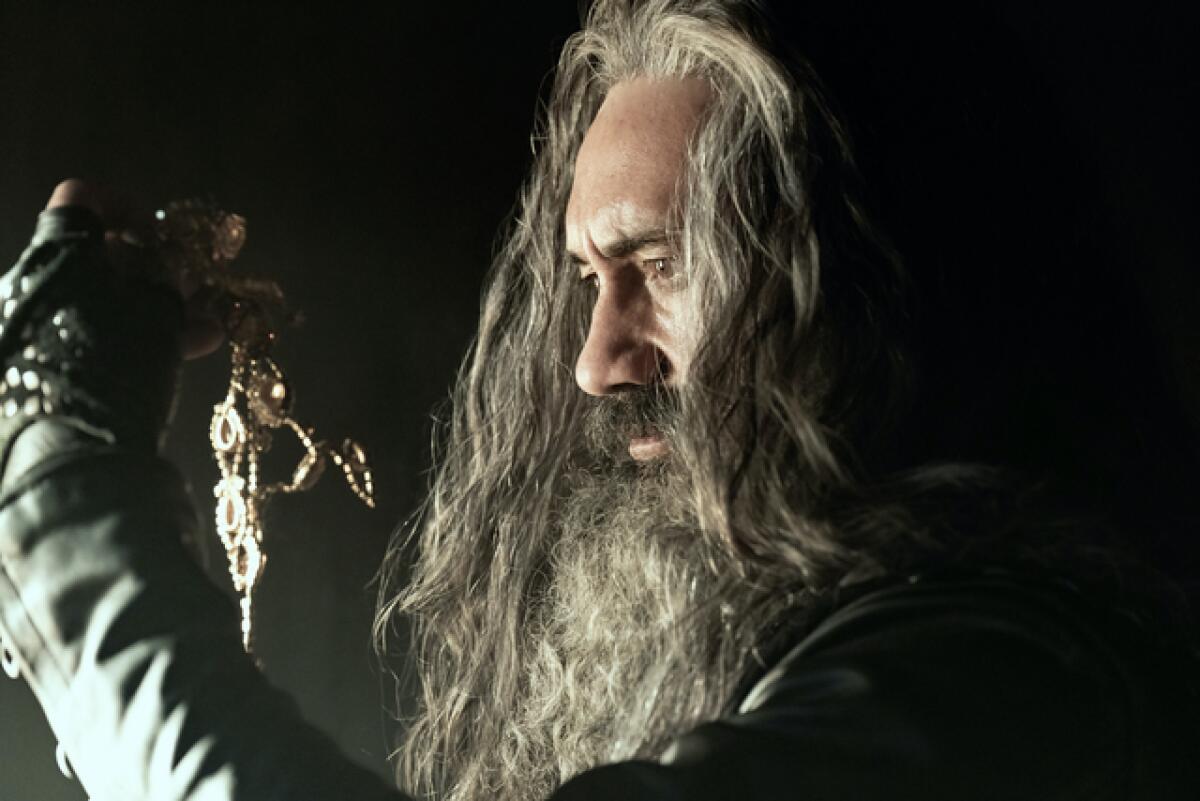
He also has something to prove to himself, having been called “a lily-livered little rich boy” by his late father and mocked by his boarding school classmates, one of whom, an English officer played by Rory Kinnear, continues the mocking when Stede meets him again on the bounding main, even (as a hectoring hallucination) after he winds up dead from a cutlass in the eye. That Stede reads to his crew from “Pinocchio” (“At last his wish had come true — he was a real boy”) is surely meant as self-reflexive, and no accident.
It’s no great trick making good guys of pirates; Disney has squeezed five family films, so far, out of its amusement park franchise, and many were folk heroes in their own time. You just make them a shade less bloodthirsty, give them an endearing quality or two and enemies of worse character (as Con O’Neill’s Izzy here) and make villains and boobs out of the establishment, represented in the show by British and Spanish navies and a shipload of idiotic European aristocrats.
The pirates under Stede are, if not first- or even second-rate, piratical in their way, mulling mutiny (“We should be pillaging. The current management’s got to go. Who’s with me?”) and not averse to violence, but they are also pictured as somewhat winsome, capable of embarrassment and not completely insensitive to the advantages of sailing with Stede. (They do like being read to, and the way he does the voices.) In spite of a little mayhem, and some purposeful confusion about where certain loyalties lie, it’s ultimately a story about friendship, and thus cheery at its core.
The complete guide to home viewing
Get Screen Gab for everything about the TV shows and streaming movies everyone’s talking about.
You may occasionally receive promotional content from the Los Angeles Times.
Their adventures will take them through a host of settings familiar from pirate lore and movies (a tropical isle, the Republic of Pirates) and also unfamiliar (a sort of high-society party ship), where they will encounter a host of well-known character actors and comedians, including Gary Farmer (from “Reservation Dogs,” which Waititi co-created) as a native chief, Leslie Jones as an underworld kingpin, Fred Armisen as one of her many husbands/henchmen, and Nick Kroll and “Conchords” regular Kristen Schaal as decadent French aristocrats.
As in “People of Earth,” there is a lot going on, with a host of characters guarding secrets — as with Lucius (Nathan Foad), a sort of executive cabin boy, and Oluwande (Samson Kayo), protective of Jim (Vico Ortiz) — or engaging in pirate side hustles. But the core of the series is the evolving relationship between Bonnet and Blackbeard, who did in fact have one, if not quite this one, and which builds sympathy for the characters and sympathies between them. Each has his strengths, his special knowledge. (Blackbeard understands carnage, but Stede will have something to teach him about passive-aggression.) They might become, in their way, better people — that part is possibly not historical.
‘Our Flag Means Death’
Where: HBO Max
When: Any time, starting Thursday
Rating: TV-14 (may be unsuitable for children under the age of 14)
More to Read
The complete guide to home viewing
Get Screen Gab for everything about the TV shows and streaming movies everyone’s talking about.
You may occasionally receive promotional content from the Los Angeles Times.
